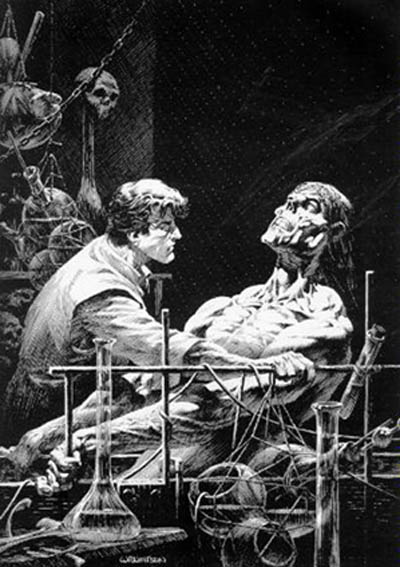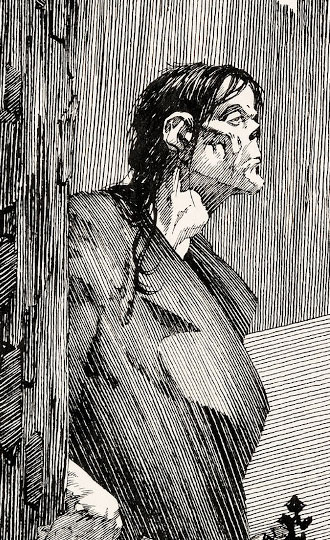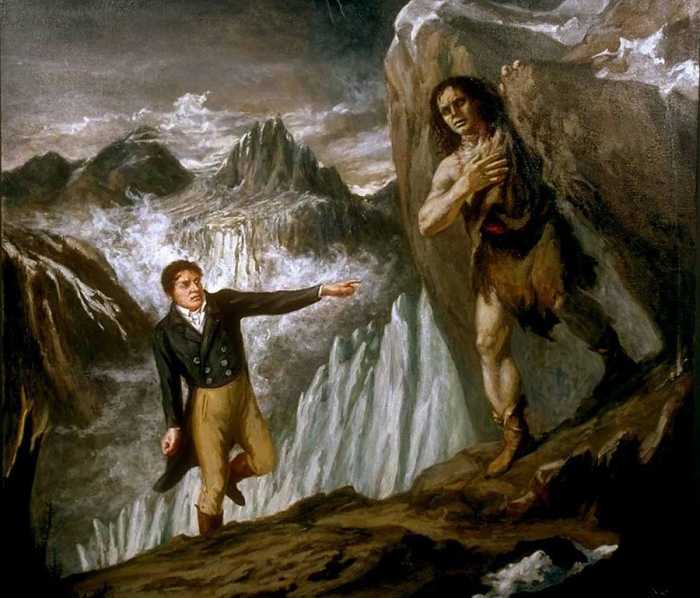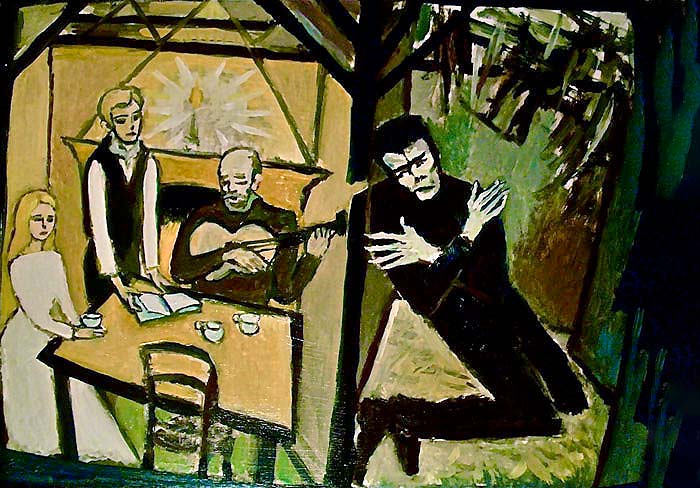Victor Frankenstein and his Daemon: A Study of their Dialogue

The dialogue between Victor Frankenstein and his creature is one of the most interesting discourses in contemporary literature. Creator and created face each other in a moment when fear and apprehension has created a barrier between them. Frankenstein is already well known for its unusual creator-creature relationship, but the first conversation between Frankenstein and his monster shows the reflection of each other that has often lead readers to give the creature the name of his maker.
Victor Frankenstein’s first reaction to seeing his monster was one of hate and disgust, and yet the creature’s reaction was one of acknowledgment. Frankenstein says to the creature,
And, oh! That I could, with the extinction of your miserable existence, restore those victims whom you have so diabolically murdered!
Shelley, Mary Wollstonecraft. Frankenstein. London, 1818. pgs. 113-116.
To which the creature responds,
I expected this reception… All men hate the wretched; how, then, must I be hated, who am miserable beyond all living things! Yet you, my creator, detest and spurn me, thy creature, to whom thou art bound by ties only dissoluble by the annihilation of one of us. You purpose to kill me. How dare you sport thus with life?
(113)

The creature isn’t awed by his creator but still sees that only Frankenstein can accomplish what he needs. He recognizes that Frankenstein is not benevolent and caring of him, but acknowledges that only Frankenstein had the power to make him a companion. The creature also recognizes that where Frankenstein had the power to create, Frankenstein also had the power to destroy.
The reply of the scientist was,
Why do you call to my remembrance… circumstances of which I shudder to reflect, that I have been the miserable origin and author? Cursed be the day, abhorred devil, in which you first saw light! Cursed (although I curse myself) be the hands that formed you!
(115-116)

This answer seems to present the mirroring between these two characters that Frankenstein himself is so ashamed to admit. He curses himself for interfering with death and trying to reanimate the dead, and yet he looks upon the consequence of the desires that have overcome him.
The dialogue between them seems to show that only the creature understands that he is a reflection of his maker, but this is a truth that Frankenstein himself is trying so hard to deny. However, the creature also knows that he was made to be more powerful as well. He says to Frankenstein,
Remember, thou hast made me more powerful than thyself; my height is superior to thine, my joints more supple.
(114)
He knows that even though he has physical strength, it is his creator who has the mental prowess and intelligence. Thus, they are more than reflections, but rather, complements of each other. This conversation alone shows so much of the yin and yang balance of opposites between the two of them: brains and brawn, life and death, maker and made. The irony in this part of the conversation is that although the creature makes it known to Frankenstein that he is stronger and can easily kill Frankenstein and his family (as he has already done with little William), he still puts himself at Frankenstein’s mercy because he knows that Frankenstein is the only one with the power to make him a companion. If Frankenstein cannot protect him as a creator would, then the only protection the creature is willing to accept is that of having someone else like him so he’s safe from loneliness.

This very Biblical allusion puts Frankenstein in a position where they face an ultimatum. Just as Adam and Eve had to depart the presence of God after they displeased Him, the creature falls from the favor of his creator. He even says,
Remember that I am thy creature; I ought to be thy Adam, but I am rather the fallen angel, whom thou drivest from joy for no misdeed. Everywhere I see bliss, from which I alone am irrevocably excluded. I was benevolent and good; misery made me a fiend. Make me happy, and I shall again be virtuous.
(114)
But this is not a very complete allusion to the story of Adam and Eve, because Adam too was cast out of Eden for a misdeed, and so is the creature. He was despised of Frankenstein first for his appearance and second for murdering William. And the creature is not beloved to Frankenstein as Adam was to God despite the disobedience that cast him out in the first place. God also gave Adam and the entire race of mankind the key to coming back to His presence through His Son, Jesus Christ. Frankenstein offered no such salvation for his creation.

The creature then proceeds to narrate his adventures, and then it is discovered how he learned to read and speak so intelligently. Meeting the old man and his children during another chapter made the creature feel loved for the first time in his life. But that is lost when he reveals his appearance to them. It’s at this point that he begins to question why he would be created this way. This leads him to conclude that whoever created him cannot be all benevolent, for it shows in the results of his mad experiments.
If Frankenstein is truly supposed to be a New Prometheus, then he has truly become a new type of Prometheus, one that is a creator-destroyer that was never meant to create in the first place. The conversation between Frankenstein and the creature gives so much insight into the inner turmoil that both of them experience simultaneously. It also shows the points in time where their motives and characters are so reflective of each other. This may possibly lead to the possibility of Frankenstein not just making a monster, but also making a monster of himself.
What do you think? Leave a comment.











I see Frankenstein’s monster as a child here. He barely learned good and evil and is still grappling with the concepts of right and wrong while being shunned by everyone. But I also think he had an emotional journey growing up basically, realizing what he did was purely evil and says he’ll destroy himself sparing someone else the misery of finding out about him.
I absolutely loved this novel. Any of you guys recomend any other novels that’s worth reading? Something in the same genre.
Benjamin Dolk Dracula is a cool book and it’s around the same timeline as Frankenstein I think (1800s) that’s all I’ve though of so far.
It’s weird that almost everyone in the English speaking world knows about Frankenstein’s monster, but so few know the actual story.
It’s all due to Hollywood, sad to say and how people assume that they’ve read the book as a result. Which is a true shame…
Loved this book. It’s about morality and choice; and how, since man can choose to be evil or good, we are essentially neither. Meaning, when someone says people are essentially good, because we can choose to be evil, then what they say is wrong, and no morality is essential to us, that is, not within our essences.
Poor creature, all he wants is someone to love him. I would be his friend! He might look scary but deep down he’s just a sweet, cuddly (somewhat homicidal) bunny rabbit.
Moral of the story: Don’t play God.
I read the book and I blame Victor for all this. The monster wouldnt be bad if he took care of him in the first place. I remember I felt so sorry for the monster when I read his story and that part when he gets shot when he did a good deed by saving the drowning girl… When he got rejected and feared by the DeLaceys even after the good things he did for them such as gathering wood for them (anonymous, but still). I hated it when Victor rejected and hated the monster, he was the “father”! He was the one who made him ugly, so why take it out on the monster? As for the monster…His actions were certainly horrible, but why be nice when the world has been cruel towards him?
It’s just sad though how the creature is born and dies without even having a name, forgotten and loathed by all.
The scene in the book is truly heartbreaking where after a normal conversation with the old blind man, he hears the family returning and starts panicking, then desperately and tearfully begs the old blind man to not fear or reject him. It showed how the creature just wanted to be loved and accepted by the family he’s been listening to for over a year.
Can you recommend some books in the same genre?
Other Gothic texts I love are: A Picture of Dorian Grey, Jane Eyre, anything by Edgar Allen Poe and (a more modern one) The Magic Toyshop by Angela Carter.
Wuthering Heights.
The most fascinating edition of Frankenstein was published in 1821 in which the monster takes the form of a demon-vampire!
Good observation of this story in noting that there is an element of inversion of the Biblical creation story in Genesis. Nice job too!
It’s just me or the whole idea that people have about Frankenstein’s history differs completely of the book?! I read this book without any knowledge about it except what I got from movies and random allusions to the monster. I’m still surprised of what I found in the real novel.
There are so many different levels to which the book relates to including the French Revolution where the oppressed and rebellious monster was symbolic of the poor people of Paris relative to family of Frankenstein representing the bourgeoisie. Mary Shelley undertook extensive research into the French Revolution with her partner Percy Shelley when they eloped to Paris during the summer of 1814 with Mary having undertook critical analysis of both sides of the conflict in relation to the cause of the both the Jacobins V the Anti-Jacobins. Her fascination with the French Revolution was a major influence in her later writing of Frankenstein thanks in no small part to the role played by her parents involvement as radical political philosophers during the time of the Revolution.
If you’ve seen the tv-show Penny Dreadful, there’s an episode where the guy that plays the creature from Frankenstein also plays Lucifer and after reading the book I was like “Woah”. Lmao, I don’t know if it was intentional or just something random but it made me really excited for some reason. And also in the show the creature also asks Victor to make him a bride, and Victor actually does, but the second attempt was better looking and she turned from him as well eventually, and that, I thought, was also one of the fears of Victor in the book. Like, who was to say that the bride would just love the creature just ’cause they were similar? She could have rejected him too, and then what would the creature have done? Just such an interesting read, I’m so mad I waited this long! Gotta make some of my friends read it too so I can rant about it with them.
I only recently read this book and was mindblown by how much I enjoyed it! And also by the fact that I thought Victor was such an interesting character to read about!
Mary is as interesting as the story. I like how she never really tells you how the monster comes to life. She gives a strong hint with victor seeing a tree destroyed by lighting earlier, but never says that’s the secret of his animation. The captain in the story asks these details but Victor refuses to tell him.
I think that was so clever. It’s like Mary couldn’t even tell YOU, the reader, about it. Made it feel more real.
Victor was not a doctor, official (doctorate/medical) or dubbed one because of his accomplishments. He was a college dropout, and a man unhealthily obsessed with science, not a doctor. He didn’t take responsibility for his actions or act professional in any of his pursuits, but he was certainly a very determined man.
I just finished it and I thoroughly enjoyed it. The only thing is: why did Victor destroyed her? I mean, many lives would’ve been saved if he got his company.
I first read Frankenstein when I was 14 I was fascinated by the gothic style of the novel.
Great article, and one of my favorite novels! I re-read it a few years ago and it inspired me to continue the story in an unusual format–a board game. Sounds weird, but it turned out pretty cool and got published last year.
The environment that spawned the writing of Frankenstein was a global catastrophe known as the year without a summer in which mt tambora erupted blocking out the sun for an entire year. That summer there was a writing contest and Frankenstein was Mary Shelly’s entry.
This book is amazing.
I think Victor Frankenstein was the one at fault. I don’t think he created the monster for no reason, but I do think he should’ve taken responsibility for his creation, and should’ve tried to help it.
I just read this book, and it is now one of my favourites. I’m looking for different people’s interpretations of the book (I’m always curious to hear other perspectives). Great article. Anyway I feel like the monster was basically a victim to his life, and I wish someone had given him some love and validation before the Murders happened
All my life I was taught Frankenstein was a horror story, but now that I understand it, I now know that it’s about judging people based on their appearance, accepting difference, and a quest of revenge.
Studying Frankenstein agred 15, and the excellent English teacher who taught it to me are probably the reasons that I’m doing a PhD in Literature now, when I’m not being distracted by CiF.
I’ve always been fascinated by the doppelganger aspect of Frankenstein/Creature.
The monster is Frankenstein. The Daemon is not the monster. Just being cheeky.
I really love this novel. And, I get so annoyed too about how people refer to the monster as Frankenstein.
Welcome to the club!
I just started reading Frankenstein and I’m really liking it so far!
I say Dr. Frankenstein is at fault. His creation simply wanted love and friendship he didn’t know how. Dr. Frankenstein is the real monster rejecting his creation. That is the true face of evil.
I’ve read the book three times, and listened to an audio book twice. Each time, I discover something I’ve missed. I have an unnatural addiction to this novel.
This is such a fascinating story that can spark a lot of intelligent a provocative conversations about the themes and characters…
You make some nice observations here, especially concerning the Biblical connections. As you say, Victor Frankenstein does not offer his creation the redemptive opportunities/heavenly salvation God offers humanity despite their failings. I also like the connection you make at the end about the similarities between Frankenstein’s creature and Prometheus.
James Whale’s and Boris Karloff’s interpretation of the creature is very different than Mary Shelley’s. Then why do you have a picture of him at the top of this excellent article?
I spent a bit of time studying Frankenstein during my degree, and this is an angle I have not explored. Great read!
I love how in the book there are various allusions of the monster to both Adam and Satan, puts rather an interesting take on the original myth.
The creature is definitely the hero of the story, in my opinion, whereas Frankenstein serves as more of an anti-hero. The assembling of the Creature from dead humans also positions him as a sort of Jesus figure, raised from the dead but turned monstrous by the disrespect and rejection of his creator. I’ve written a few papers on Frankenstein but have yet to explore the specific Jesus-Creature allegory angle (though I have thought at length about the God-Frankenstein and Adam-Creature analogy, obviously the Creature’s reading of Paradise Lost lends itself primarily to that), so thank you for inspiring that train of thought!
I enjoyed your analysis of the biblical allusions and the story of Prometheus in Mary Shelley’s Frankenstein. I find that some of these allusions and references are not exactly consistent as you have noted as well. I believe this story more closely resembles John Milton’s poem, Paradise Lost, and that version of Lucifer. I believe Mary Shelley wanted her audience to draw the same conclusion by making the Creature read the epic poem. Frankenstein becomes a creator capable of such greatness, being able to create life out of death. However, a god capable of greatness must equally be capable of malevolence. God in Paradise Lost has His omniscience questioned. If an all-knowing god foresees the downfall of mankind in his most prominent angel, why create Lucifer in the first place? Lucifer becomes the victim. He was destined to fall and resents his god for creating him in such a way. God retains his omnipotence, his abilities know no bounds. However, his whole goodness is thoroughly questioned. Victor Frankenstein resembles this god more closely than the iterations in the bible. Victor is truly capable of greatness, but goodness remains questionable. He creates his monster, his Lucifer, his progeny, but he is ultimately destined to fail, to be the downfall of mankind.